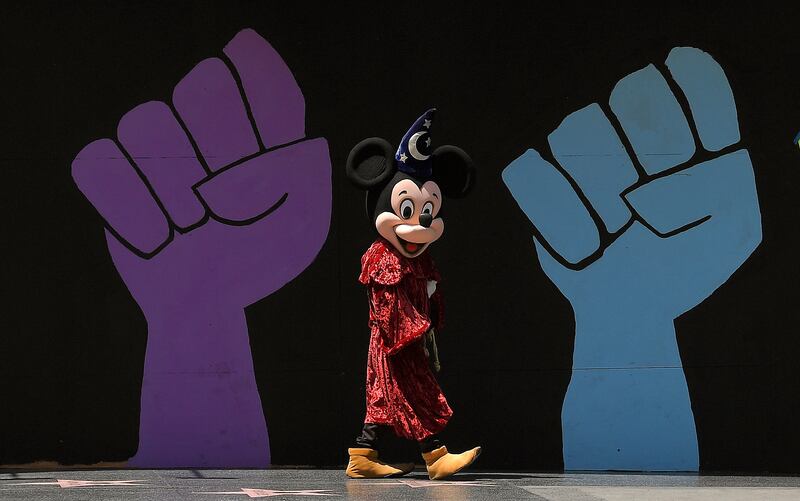Some Christians wanted to boycott Disney for celebrating “Pride” month. Others advocated ”canceling” Disney for firing a conservative actress. Dinesh D’Souza recently called for his 670,000 YouTube subscribers to stand up to “Disney’s Woke World.” Another conservative is reluctant to continue supporting Walt Disney World after the theme park removed racist elements from the Jungle Cruise attraction.
Perhaps I’d feel more inclined to consider these complaints, or at least hear them out, if more Christians and conservatives had raised objections amid scores of questionable Disney stories that have been embraced and celebrated over the years.
Take the story of a little mermaid who transformed her body and gave up her voice to be with a man she’d never met before. Or Belle falling in love with a literal beast (who had just imprisoned her, no less), or Meg selling her soul to Hades in “Hercules,” or an island of children smoking cigars and drinking themselves silly in “Pinocchio.” If none of that rises to the level of concern some Christians feel today when they see Mickey Mouse sporting “Pride” gear, then it seems to me that a Sunday School lesson or two may have gone off track.
While certainly religious liberty is a freedom worth defending, and good citizens should always stand up for the dictates of their conscience and moral preferences in the public square, I wonder if somewhere along the way some Christians and conservatives have lost sight of what it really means to be both.
Few raised objections, for instance, to baby Dumbo getting drunk, or scores of teenage Disney princesses getting married, or thousands of animated displays of death or murder, or numerous examples of racial insensitivity, or the many bare-breasted characters of Disney’s “Fantasia.” But, there seemed to be plenty of ire over a character in Disney’s “Onward” who makes reference to her “girlfriend’s daughter.”
Prominent Christian influencer, Brooke Poston, boycotted Disney over a “gay moment” in the live action “Beauty and the Beast” movie, and Franklin Graham has called out “Disney’s LGBTQ agenda.”
As a fellow Christian, I fail to see what boycotting the “gold standard” of family entertainment accomplishes. Similar to how the left’s attempt to boycott Chick-fil-A over its founder’s religious views backfired spectacularly; calls from the right to cancel Disney+ subscriptions over its firing of Gina Carano backfired as well when subscriptions of the platform actually increased 9 million from the previous quarter.
In addition to being ineffective, a Disney boycott seems to be a great example of “throwing out the baby with the bath water.” Disney, with all its flaws, still produces more family-friendly entertainment than perhaps anyone in the game. This isn’t to say that Disney shouldn’t receive public and well-reasoned critiques. But such criticism should be self-aware and aimed to improve and unite rather than “cancel” and exclude.
And is it really fair for one group of people to define the type of entertainment that’s meaningful for a diverse, global audience? Whatever happened to people tuning into the programs or showing up for the movies they’re interested in and simply steering clear of the ones they’re not?
Patronize what you like from Disney, and pass on what doesn’t fit your tastes. It’s one thing to want to protect one’s religious beliefs. I understand that. But it’s quite another to expect publicly traded businesses to only cater to those beliefs, “or else.”
Perhaps the most meaningful reason to check one’s anti-Disney “wokeness,” however, is to consider the opportunities for inclusion, acceptance and understanding of the real-life individuals who actually benefit from Disney’s recent decisions.
Apart from admittedly ham-fisted pandering and at-times gaudy commercialization, some of Disney’s changes reach real human beings who, like me, value and appreciate these overtures toward greater inclusivity and representation.
To me, advocating so vehemently against the inclusion or representation of LGBTQ individuals in films and TV comes awfully close to advocating for their stigmatization. And advocating against changing racially oppressive films (or even amusement park rides) once again starts to feel like a deliberate denial of the hurt or pain that people of color may feel when they experience those films and attractions.
Conservatives and Christians who fail to recognize the people Disney hopes to reach with “woke” changes are also failing to recognize the very pain and prejudice that patriots fought to end and Christ himself died to help heal.
Daryl Austin is a journalist based in Utah. His work has appeared in National Geographic, The Atlantic, The Wall Street Journal, Psychology Today and The New York Times.



